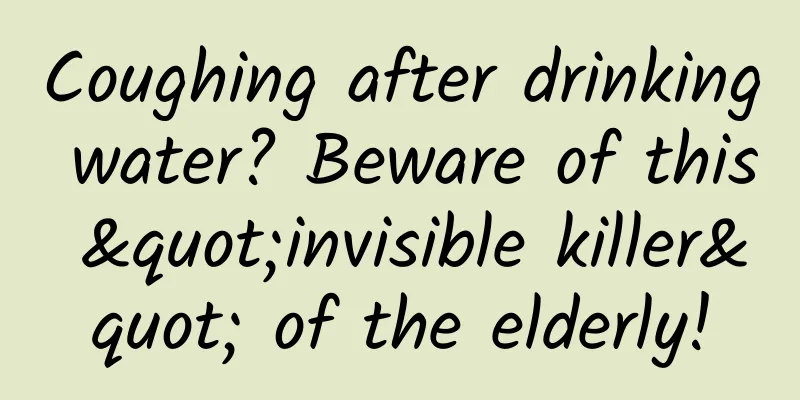Coughing after drinking water? Beware of this "invisible killer" of the elderly!

|
Author: Sun Xiaohong, Chief Physician, Peking Union Medical College Hospital Reviewer: Qu Xuan, deputy chief physician, Peking Union Medical College Hospital The problem of coughing after drinking water is particularly common among the elderly and is also easily ignored. Figure 1 Original copyright image, no permission to reprint If you are drinking water quietly by yourself and find that you drink less water in a sip than before, and you cough easily during or after drinking water, you must be alert to swallowing difficulties! 1. Dysphagia is the “invisible killer” of the elderly! We generally believe that choking when drinking water is a normal phenomenon in the process of aging, and not many people care about it. At the same time, we find that the older the age, the higher the proportion of hospitalization due to lung infection, and most of these hospitalized elderly people suffer from aspiration pneumonia caused by dysphagia and aspiration. We encounter many elderly people who come to the emergency room for severe lung infections. When we ask them if they have difficulty swallowing, many of them or their family members will say that they eat normally and have no difficulty swallowing. But when I ask in a different way, have you ever choked or coughed when drinking water? Or for the elderly who need care, is there any food left in their mouths when they rinse or clean their mouths one hour after eating? When we ask this question, the person or their family members will say that this has indeed happened. This is the early manifestation of dysphagia. At this time, there is already a potential risk, but it is easy to be ignored. It will not be taken seriously until it eventually leads to serious consequences. Figure 2 Original copyright image, no permission to reprint For example, when an elderly person has developed aspiration pneumonia, or comes to the hospital for treatment due to weight loss or severe malnutrition, after a series of tests, when no other cause can be found, it is discovered that the elderly person's food intake has decreased due to dysphagia. This situation is quite common. Therefore, dysphagia is called the "invisible killer" of the elderly. 2. The "EAT-10" screening scale can help the elderly self-test their swallowing difficulties! In clinical practice, screening can be carried out using a simple scale, and the commonly used one is the "EAT-10" screening scale. When we encounter elderly, frail people, or elderly people with neurodegenerative diseases such as Parkinson's disease, we can use the EAT-10 scale for a preliminary assessment. The "EAT-10" screening scale contains 10 questions, including swallowing problems leading to weight loss, swallowing problems affecting dining out, difficulty swallowing liquid food, difficulty swallowing solid food, difficulty swallowing pills, swallowing pain, swallowing difficulties affecting appetite, food stuck in the throat when swallowing, coughing while eating, and straining when swallowing. Each of the above questions has a score of 0-4 points, with 0 representing none and 4 representing the most severe degree. You can also use this scale to test yourself. If the total score exceeds 3 points, we should do an objective evaluation and conduct further examinations under the guidance of a doctor to clarify the diagnosis. 3. The Kubota water drinking test and swallowing radiography are commonly used methods to diagnose dysphagia! The Kubota water drinking test is to prepare about 30 ml of warm water and let the patient drink the water while sitting. When drinking water, the following points should be evaluated: first, whether the water can be drunk in one gulp or in several times; second, whether there is choking during the drinking process; and third, whether the drinking speed is very slow. If the water cannot be drunk in one gulp, or if the water is drunk too slowly, or if there is choking while drinking, it indicates that there is dysphagia in the pharynx. Figure 3 Original copyright image, no permission to reprint In addition, swallowing contrast examination can also be performed. It is best to use oral diatrizoate as a contrast agent. Even if it is choked into the lungs, it can be absorbed and is very safe. Continuous filming during the drinking process can be used to observe whether it is inhaled during the examination. During the monitoring process, contrast agent retention or contrast agent visualization in the lungs can be observed. The former indicates the risk of aspiration, while the latter indicates that aspiration has occurred. Dynamic swallowing with diatrizoate can help us evaluate the location of swallowing disorders, such as the oral cavity, pharynx, and upper esophagus. At the same time, we can also make contrast agents into different volumes, such as 5ml, 10ml, or 20ml, and different properties, such as liquid, jelly, or solid, to determine how much volume and properties of a certain food is safe to swallow. Of course, swallowing difficulties only occur with large mouthfuls, indicating that the swallowing disorder is not so severe, and swallowing difficulties occur with small mouthfuls, indicating that the swallowing disorder is relatively severe. This helps the elderly determine the nature of eating and the amount of food eaten per mouthful, which is not easy to cause swallowing disorders and aspiration. Once the diagnosis is confirmed, under the guidance of a doctor, appropriate measures should be taken to improve the swallowing difficulty and prevent the occurrence of serious complications such as malnutrition and aspiration pneumonia. |
<<: Will long-term consumption of MSG harm your health?
Recommend
What does breast grade 4 mean?
Suffering from breast disease is a very scary thi...
Vaccines against cervical cancer
This past January was Cervical Cancer Awareness D...
There are no symptoms in the early stage, but the harm is great in the later stage! Beware of the "silent killer" - kidney atrophy
During a physical examination, Xiao Li found that...
Can I take Nujin Wan during menstruation?
Nujin Wan is the name of a Chinese medicine presc...
What are breast calcifications?
Nowadays, people are very concerned about their p...
What is the normal age for menopause?
Menopause is a stage that every woman will go thr...
Twenty-one weeks pregnant with a boy
There is a saying in folklore that if a woman has...
What are the causes of right chest pain?
If you have a dull pain in the right chest, it is...
Normal ferritin levels in 6-month-old pregnant women
During pregnancy, in order to ensure the physical...
How many days does it take for cervical cancer screening results to come out?
Women who suspect they have cervical cancer can u...
How to regulate high testosterone levels in girls
If the estrogen level in the female body is too h...
Does itching during pregnancy affect the fetus?
After a woman becomes pregnant, the secretions in...
80% of women don’t know the process of cervical erosion!
Cervical erosion is the most common cervical dise...
Precautions after sweating during cesarean section
Sweating is a relatively common condition, and it...
28 weeks stomach tightness and hardness
Generally speaking, when a woman is 28 weeks preg...









